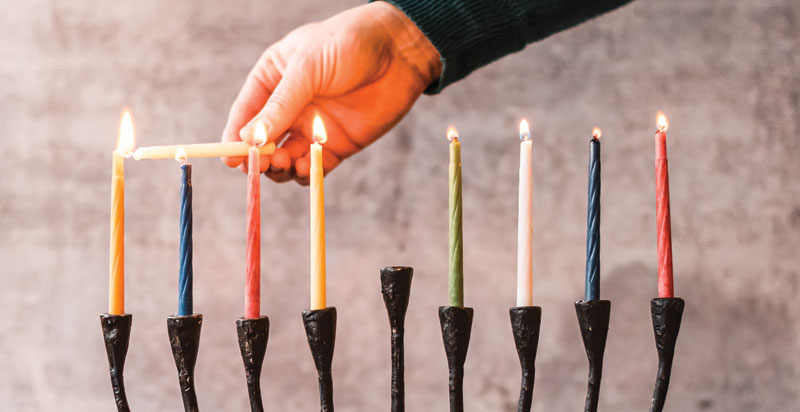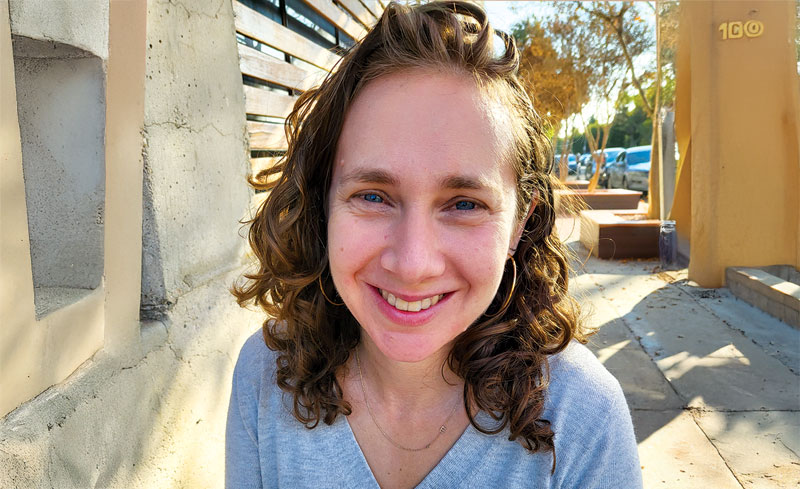“Where’s the jelly? I need five jellies.”
“Hand me 18 fruit rolls, will you?”
“I love your skirt, where did you get it?”
The scene: A typical Thursday evening at Tomchei Shabbos’ warehouse, at 353 1/2 N. La Brea Ave., where a team of fast-working, quick-talking volunteers gathers to pack overflowing food boxes for needy families in Los Angeles.
The small warehouse, lined with shelves filled with staples such as rice, oil, matzos, gefilte fish, mayonnaise, peanut butter, jam, rice, noodles and Shabbat candles, is bustling. Volunteers step over neat rows of crates of packaged salad greens, bags of produce, challas, noodle kugels and apple pies, as they stock their boxes.
Tomchei Shabbos, meaning “supporters of the Sabbath,” was founded 22 years ago to help six needy families put food on their tables for Shabbat. Today the organization sponsors a clothing gemach (charity), distributes used furniture and appliances to the needy, and on a budget of no more than $10,000 per week, sends food to as many as 200 families on a weekly basis. More than 300 families receive food supplies for holidays.
High Holiday food deliveries include extra fare, such as meat and ingredients for stew. Passover packages include kosher spices, aluminum foil, detergent and seder foods “from soup to nuts.”
Rabbi Yonah Landau, the director of Tomchei Shabbos for the past 19 years, walks briskly throughout the warehouse, supervising incoming deliveries of frozen chickens and gallons of milk. He, like everyone else with the organization, is a volunteer. When not working long hours for Tomchei Shabbos, he runs an insurance agency.
Michelle Lehrer manages a medical office. Steve Berger trades Israeli bonds. They team up together on Thursday evenings as the Tomchei Shabbos warehouse managers. Lehrer and Berger make sure that each family receives its allotment, determined by the number of children and any special needs. Their lists and the boxes marked for each family are all in code. For example, the box marked “MAR” is slated to go to a family that has not one of those letters in its name. The recipient families’ identities are guarded jealously.
Although some families welcome the delivery crew with greetings and thank yous, most deliveries are left at the door. Some are left with a neighbor, or another third party, such as relatives or friends. Some families, despite dire straits, are too embarrassed to take food, Landau says. In these cases Tomchei Shabbos arranges for a credit at the local market.
“These are working families,” Landau explains. “They’ve run into trouble.” He recalls stories of lost jobs, illness and large families who just don’t earn enough to make ends meet. “Here’s a father of four, who works in the flower business,” Landau says. “He had surgery and was laid up for a month. He didn’t have food for the children.”
“Here’s a contractor with three kids, who didn’t have enough work,” Landau continues. “He got a three-day [eviction] notice. I told him that in 15 minutes someone would deliver a check to pay for three months rent.”
Landau relates story after story of families who fall on hard times, and elderly recipients whose social security payments are only slightly more than their rent. He notes that Tomchei Shabbos volunteers try to help families get out of difficult situations. “I know of a man who made $250,000,” Landau says. “He lost his job, depleted his savings, had no money for food. No one knew he had no money. Then he lost his house. We helped with rent money many times. Then we found his wife a job.”
Tomchei Shabbos’ network stretches throughout the city and into the Valley. One volunteer who came to the warehouse Thursday with her five children says, “I see a lot of local businessmen here. They give of their money and their time.”
The businessmen work side-by-side with the high school students, yeshiva boys and assorted younger and older adults. Tsvi and Betty Ryzman have sponsored this week’s entire shipment in honor of their son Elie’s marriage to his wife, Adina, and a number of the extended Ryzman clan, including the bride and groom, came to pack food.
“It’s a wonderful thing for young people who are raised with everything to see this,” says Betty Ryzman, whose family also sponsored the week’s Tomchei Shabbos shipment after her daughter’s wedding. “There’s a big flamboyant wedding, then this (packing food for the needy).” She notes that her family’s post-wedding custom is a variation on the theme of an old custom from Europe. The day before a wedding the families would sponsor a seudat ani’im, a meal for the poor.
A UCLA student crosses Ryzman’s path with a box of cans. “Give everyone a can of tomato sauce,” she instructs a team of two yeshiva students and a lawyer. Tomato sauce in place, the boxes begin their exodus out of the warehouse as a line of mostly elderly recipients begins to form outside.
Next week the scene will be repeated. And the next week. And the next holiday. Although Tomchei Shabbos organizers and volunteers hope for the day that there will be no need for their services, they recognize the biblical statement (Deuteronomy 15:11), “For the poor shall never cease out of the land; therefore I command you saying, ‘You shall open your hand wide to your brother, to your poor, and to your needy in your land.'”






















 More news and opinions than at a Shabbat dinner, right in your inbox.
More news and opinions than at a Shabbat dinner, right in your inbox.